Thousands flee Gaza’s main hospital amid heavy fighting outside but hundreds of patients still trapped
Jason Burke
Hundreds of patients, including dozens of babies, remain trapped inside Gaza’s largest hospital as Israeli troops and Hamas militants take part in heavy fighting outside it.
Dar al-Shifa hospital is a sprawling complex of medical facilities in Gaza City, in the north of the Gaza Strip.
Located about 500 metres from the coast and a major north-south road, it comprises a group of six-storey buildings that dominate the skyline.
The hospital, which has between 600 and 900 beds and thousands of staff, was the mainstay of healthcare provision locally, with a range of services that few of the other hospitals in Gaza could offer.
Since the beginning of the war, it has become a shelter for those displaced by the fighting and continuing Israeli bombardment.
Key events
About 40 Spanish citizens were evacuated from Gaza on Monday through the Rafah border crossing into Egypt, Reuters reported that acting foreign minister José Manuel Albares said.
Albares said in a press briefing:
I confirm that 33 Spanish-Palestinians to be precise and 7 family members have already crossed the Egyptian checkpoint at the border between Gaza and Egypt at Rafah.
He added that Spain had received authorisation from Israel for a second group of about 80 people to leave Gaza on Tuesday.

All hospitals in northern Gaza out of service, says health ministry
All of the hospitals in northern Gaza are no longer functioning amid fuel shortages and intense combat, the Hamas-run health ministry in the besieged territory has said.
Youssef Abu Rish, the deputy health minister, told AFP on Monday that all hospitals were “out of service” in the territory’s north.
The World Health Organization (WHO) has said that at least 2,300 people – patients, health workers and people fleeing fighting – were inside Dar al-Shifa hospital, Gaza’s largest facility.
Here are some of the latest news wire images from Gaza.
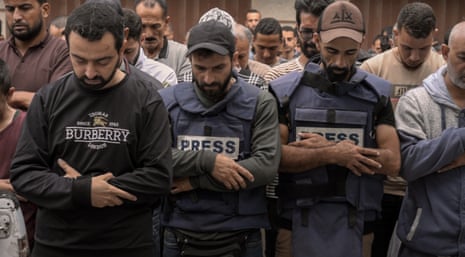
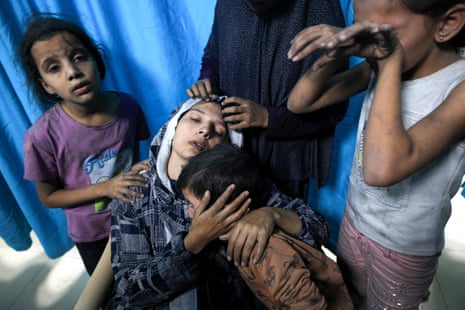
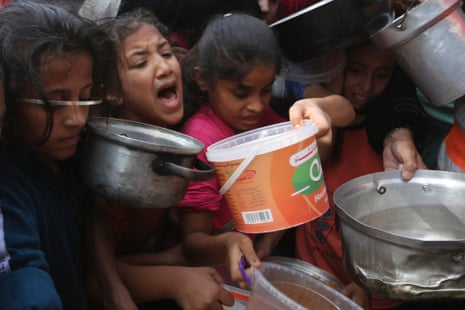
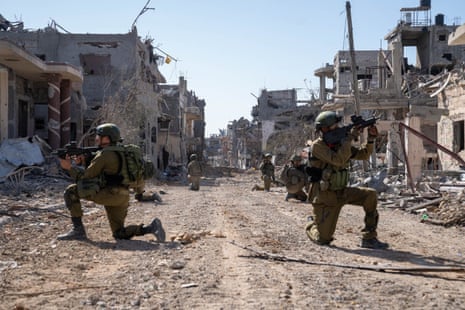

Patrick Wintour
Tony Blair, the former British prime minister, has let it be known that he is available if needed to help in an effort to end the growing crisis in Israel and Palestine.
Blair has strong contacts with the Gulf states. In an earlier period, he played a role behind the scenes encouraging Hamas to change its stance towards Israel, but he has always been implacably opposed to the direction of the Iranian leadership.
Blair admitted to the journalist Donald Macintyre, the author of a study of Gaza, in 2017 that he regretted the western decision not to engage with Hamas after it won legislative elections in the Palestinian territories in 2006, leaving Hamas largely ostracised and short of political, as opposed to military, options. He said in retrospect the West should have tried to pull Hamas into dialogue.
Blair was appointed special envoy for the Quartet – a body which is made up of the United Nations, the European Union, the United States and Russia – immediately after leaving No 10 in 2007, and resigned in 2015. His job was not general peacemaking, but a more narrow focus on technical topics such as increasing humanitarian aid, strengthening the Palestinian economy, and bolstering governance in the occupied territories, including the Palestinian Authority.
In the role he found himself fighting relatively small battles with Israel to remove dozens of Israeli checkpoints in the West Bank, ease the movement of workers, and free the transport of Palestinian products to markets. He also helped boost tourism in the West Bank town of Bethlehem, and helped secure thousands of permits for Palestinian labourers to work in Israel.
Ultimately the scale of the Israeli blockade, born out of Israel’s security fears, made the job untenable since without political coexistence, there was little chance of economic progress on the West Bank.
United Nations workers observed a minute’s silence on Monday for the more than 100 colleagues killed in Gaza since the Israel-Hamas war began last month, marking the deadliest conflict ever for UN workers.
Staff at UN offices in Geneva bowed their heads as a candle was lit in memory of the 101 employees of the UN agency for Palestinian refugees (UNRWA) killed since 7 October.
Tatiana Valovaya, director general of the UN office in Geneva, said:
We are gathered here today, united in this very symbolic location, to pay respect to our brave colleagues who sacrificed their lives while serving under the United Nations flag.
The UN’s secretary general, António Guterres, shared a photo of him marking a moment of silence in the organisation’s headquarters in New York.
Today, the @UN family observed a moment of silence to mourn & honour our colleagues killed in Gaza.
Since the start of this conflict, more than 100 @UNRWA staff have lost their lives – the highest number of UN aid workers killed in a conflict in such a short time.
They will… pic.twitter.com/O9ZBy92Xu0
— António Guterres (@antonioguterres) November 13, 2023

Harriet Sherwood
The archbishop of Canterbury has called for a ceasefire in the war between Israel and Hamas, saying the scale of civilian deaths and humanitarian catastrophe in Gaza cannot not be “morally justified”.
“The killing must stop,” Justin Welby said, adding that the call for a ceasefire was a “moral cry”.
In his opening address to the Church of England synod, meeting in London, Welby said:
As a religious leader I can say that the killing of so many civilians, the extensive damage to civilian infrastructure cannot be morally justified.
I do not have military or political answers to this crisis. I do not speak from those perspectives. But the call for a ceasefire is a moral cry that we are hearing from people of many faiths and none.
Our common humanity must find another way to achieve justice, security and peaceful co-existence for Israelis and Palestinians from now, for the future,” he added. “In Christ’s name, we cry out from our hearts: No more. The killing must stop.
Welby also called for Israeli hostages being held by Hamas to be released, and said aid must be allowed to reach people in Gaza.
His speech took a tough line, and followed his post on X, formerly known as Twitter, at the weekend, when he said the “relentless bombardment of hospitals and civilians in Gaza … must stop, and stop now”.
The relentless bombardment of hospitals and civilians in Gaza is intolerable. It’s against international humanitarian law – it must stop and stop now. The misuse of hospitals by Hamas does not justify attacks by Israel. Two wrongs don’t make a right.
The situation facing staff…— Archbishop of Canterbury (@JustinWelby) November 11, 2023

Jason Burke
Israel has claimed that Hamas has built its headquarters in bunkers and tunnels under Dar al-Shifa hospital, effectively using the building – and its patients and staff – as a shield.
Security officials have also said that, after the surprise attacks in Israel by Hamas that killed 1,200 Israelis who were mainly civilians in their homes or at a dance festival, the senior Hamas leaders have been based in a “command complex” under the hospital.
At a recent press conference an IDF spokesperson displayed a satellite photograph of the hospital site with military “command” elements marked on it, which it described as an illustration based on “the true material that we have in our hands”.
In footage said to be from an interrogation, a Hamas militant captured last month described how Hamas had “hidden in the hospitals”. Israel has also released other evidence apparently showing tunnels close to or in other medical facilities in Gaza.
Hamas and officials of the Hamas-run health authorities in Gaza have denied the claims, saying they are propaganda used to justify attacks on health facilities.
Dr Ghassan Abu-Sittah, a British doctor working at al-Shifa described the Israeli claim as an “outlandish excuse”. Human Rights Watch, the US campaign group, said it could not corroborate the Israeli allegation.
Thousands flee Gaza’s main hospital amid heavy fighting outside but hundreds of patients still trapped

Jason Burke
Hundreds of patients, including dozens of babies, remain trapped inside Gaza’s largest hospital as Israeli troops and Hamas militants take part in heavy fighting outside it.
Dar al-Shifa hospital is a sprawling complex of medical facilities in Gaza City, in the north of the Gaza Strip.
Located about 500 metres from the coast and a major north-south road, it comprises a group of six-storey buildings that dominate the skyline.
The hospital, which has between 600 and 900 beds and thousands of staff, was the mainstay of healthcare provision locally, with a range of services that few of the other hospitals in Gaza could offer.
Since the beginning of the war, it has become a shelter for those displaced by the fighting and continuing Israeli bombardment.
Death toll in Gaza rises to 11,240 including 4,630 children – health ministry
The Hamas-run health ministry in Gaza has said 11,240 Palestinians have been killed within the Gaza Strip by Israeli military actions since 7 October.
That number includes 4,630 children and 3,130 women, it said.
Israel’s prime minister, Benjamin Netanyahu, is seeking to install former UK prime minister Tony Blair as a “humanitarian coordinator” in Gaza, according to a report.
Netanyahu believes that Blair’s experience as a lead diplomat in the region could be leveraged to reduce international pressure over the civilian cost of Israel’s actions in Gaza, Israel’s Ynet news reported on Sunday.
The report indicated that Blair had been contacted over the matter and that talks had been ongoing in recent weeks. A spokesperson for the former British prime minister told the outlet that “he has not been given or offered a position”, but did not directly deny any contact.
The Financial Times reported that Blair was open to the role if he thought he could make a real difference. A spokesperson said:
As you know, Mr Blair has an office in Israel and has continued to work on issues regarding Israel and the Palestinians. He is discussing the situation obviously with a number of people in the region and elsewhere to see what can be done. But there is no ‘role’ offered or taken.
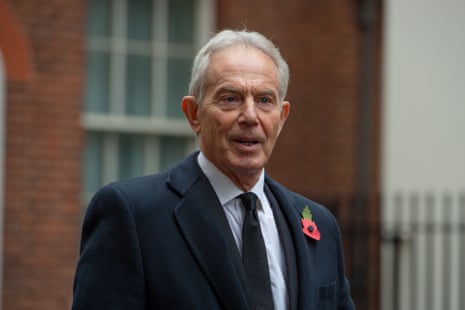
EU looking at maritime corridor to Israel

Lisa O’Carroll
EU foreign ministers are looking at a Cypriot proposal to open up a maritime corridor for urgent humanitarian aid for Gaza.
But its chief diplomat, Josep Borrell, said one of the problems was the lack of any ports in Gaza.
Israel tightly controls the waters off the coast of Gaza as part of its routine security operation, with fishers restricted to three nautical miles offshore.
The EU is looking at building jetties or pontoons to get around the problem but privately it admits it would still need Israel’s approval at least or allow it to manage the offshore ports.
Borrell said it was imperative aid got in. He said:
The UN is highlighting the lack of food and medicine and also the worrying lack of hospitals, many of which have collapsed or are near collapse.
According to the WHO, 25 out of 35 hospitals have ceased to function, they are without fuel and without fuel they cannot function.
“There is a most acute lack of basic necessities, water, medicine and food,” he said with 1.5 million internally displaced people in Gaza and hundreds of thousands without basic supplies.
We have got to get the humanitarian lorries through. We are currently talking about 40 lorries a day on the Rafa crossing (on the border with Egypt) and that is very little compared to the 500 lorries a day crossing before the war.

